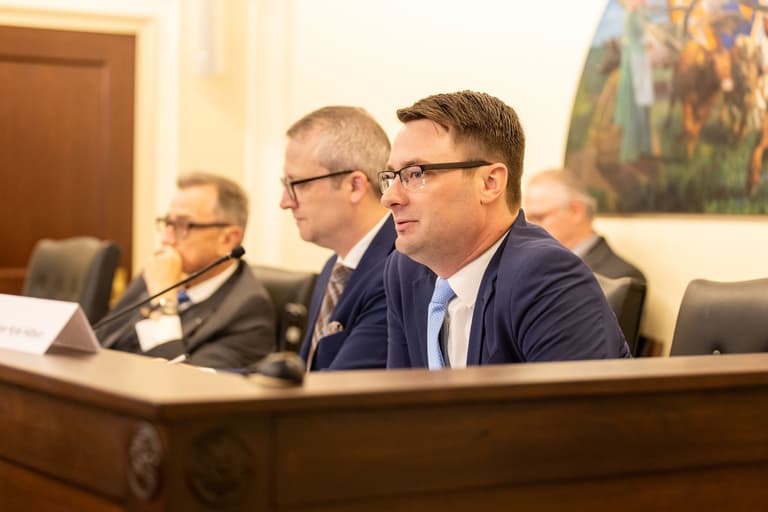
Law & Principles
Transparency reforms prompt accusation of ‘fascism’
Ray Carter | May 7, 2025
By an overwhelming majority, members of the Oklahoma House of Representatives have approved a range of reforms that will increase transparency and public participation in the state’s initiative-petition process.
House Speaker Kyle Hilbert, R-Bristow, said the overriding goal of the bill is simple: “This is a voter-empowerment bill.”
Senate Bill 1027, by state Sen. David Bullard and Hilbert, includes several transparency reforms.
The bill requires that the gist of a proposition (the description of a proposed ballot measure provided to voters) use simple language that clearly describes the proposal and avoids jargon understood by only a subset of the population.
The bill also requires that those gathering signatures be Oklahoma registered voters, and signature gatherers must publicly reveal if they are paid by outside entities to circulate a petition and identify their funders.
SB 1027 requires that those who sign a petition must first read the full ballot title for the proposed measure.
The bill requires that a gist clearly state whether an initiative petition will have a fiscal impact that could require either a tax increase or the diversion of funds from other uses.
The reform receiving the most attention and debate requires that initiative petitions receive signatures from Oklahomans across the state. Under the legislation, signatures equal to no more than 11.5 percent of the votes cast in any county during the most recent statewide general election may be collected for a petition to change state law.
“We are verging toward fascism extremely fast.” —State Rep. Mickey Dollens (D-Oklahoma City)
If a petition would amend the Oklahoma Constitution, the maximum number of signatures that may be gathered from any one county cannot exceed 20.8 percent of the number of votes cast in the county during the most recent statewide general election. (Petitions proposed constitutional amendments must obtain a significantly larger raw number of signatures to place a question before the voters.)
Hilbert noted that change requires initiative-petition efforts to collect signatures from at least 16 of Oklahoma’s 77 counties for a measure to be placed on the ballot. While that is not even half the state from a geographic perspective, it involves significantly more voter involvement across Oklahoma than what often happens with current petition efforts.
Hilbert referenced one recent initiative-petition effort that collected 70,000 signatures. Of that total, 85.9 percent of signatures came from only seven counties, and 67.9 percent of signatures came from just two counties. Those two counties, Oklahoma and Tulsa counties, are home to only 36.4 percent of Oklahoma’s population.
“The metros are getting double the say of the rest of the state under the current process,” Hilbert said.
Opponents decried the requirement that initiative-petition measures obtain support from Oklahomans across a larger share of the state.
“We are verging toward fascism extremely fast,” said state Rep. Mickey Dollens, D-Oklahoma City.
“The metros are getting double the say of the rest of the state under the current process.” —House Speaker Kyle Hilbert (R-Bristow)
“This is extremely restrictive,” said state Rep. Michelle McCane, D-Tulsa.
State Rep. Suzanne Schreiber, D-Tulsa, said the bill “limits direct democracy.”
“With the passage of this bill, the path around politics in this building (the Oklahoma Capitol) will be severely limited,” Schreiber said.
“Because of the threshold required by every county, far fewer things, if anything at all, will reach the ballot,” said state Rep. Forrest Bennett, D-Oklahoma City.
“Twenty-six states don’t have direct democracy,” said state Rep. Andy Fugate, D-Oklahoma City. “And if we pass this bill, we’ll be number 27 regardless of what the (Oklahoma) Constitution says.”
The measure has also drawn opposition from Oklahoma United, a group seeking to have Oklahoma’s election system changed to largely mirror California elections where voters’ November choices are often limited to two Democrats and no Republicans.
But supporters said the initiative-petition process should involve Oklahomans from a larger share of the state, noting that would require proposed ballot measures to appeal to most Oklahomans rather than a select subset whose interests may not align with the citizenry as a whole.
“It is important that the entire state is represented in the entire process, not only the voting but also the signature gathering,” said state Rep. Jim Olsen, R-Roland.
State Rep. Jay Steagall, R-Yukon, noted that the “consent of the governed” is a foundational concept of the U.S. government, cited explicitly in the 1776 Declaration of Independence. But under Oklahoma’s current initiative-petition process, he said Oklahoma has “two counties that are deciding the outcome of these questions that end up on our ballots.”
“We’re missing this consent piece from the other 75 counties,” Steagall said.
SB 1027 passed the Oklahoma House of Representatives on a 69-23 vote. The bill now returns to the Oklahoma Senate for consideration of House amendments.

Ray Carter
Director, Center for Independent Journalism
Ray Carter is the director of OCPA’s Center for Independent Journalism. He has two decades of experience in journalism and communications. He previously served as senior Capitol reporter for The Journal Record, media director for the Oklahoma House of Representatives, and chief editorial writer at The Oklahoman. As a reporter for The Journal Record, Carter received 12 Carl Rogan Awards in four years—including awards for investigative reporting, general news reporting, feature writing, spot news reporting, business reporting, and sports reporting. While at The Oklahoman, he was the recipient of several awards, including first place in the editorial writing category of the Associated Press/Oklahoma News Executives Carl Rogan Memorial News Excellence Competition for an editorial on the history of racism in the Oklahoma legislature.